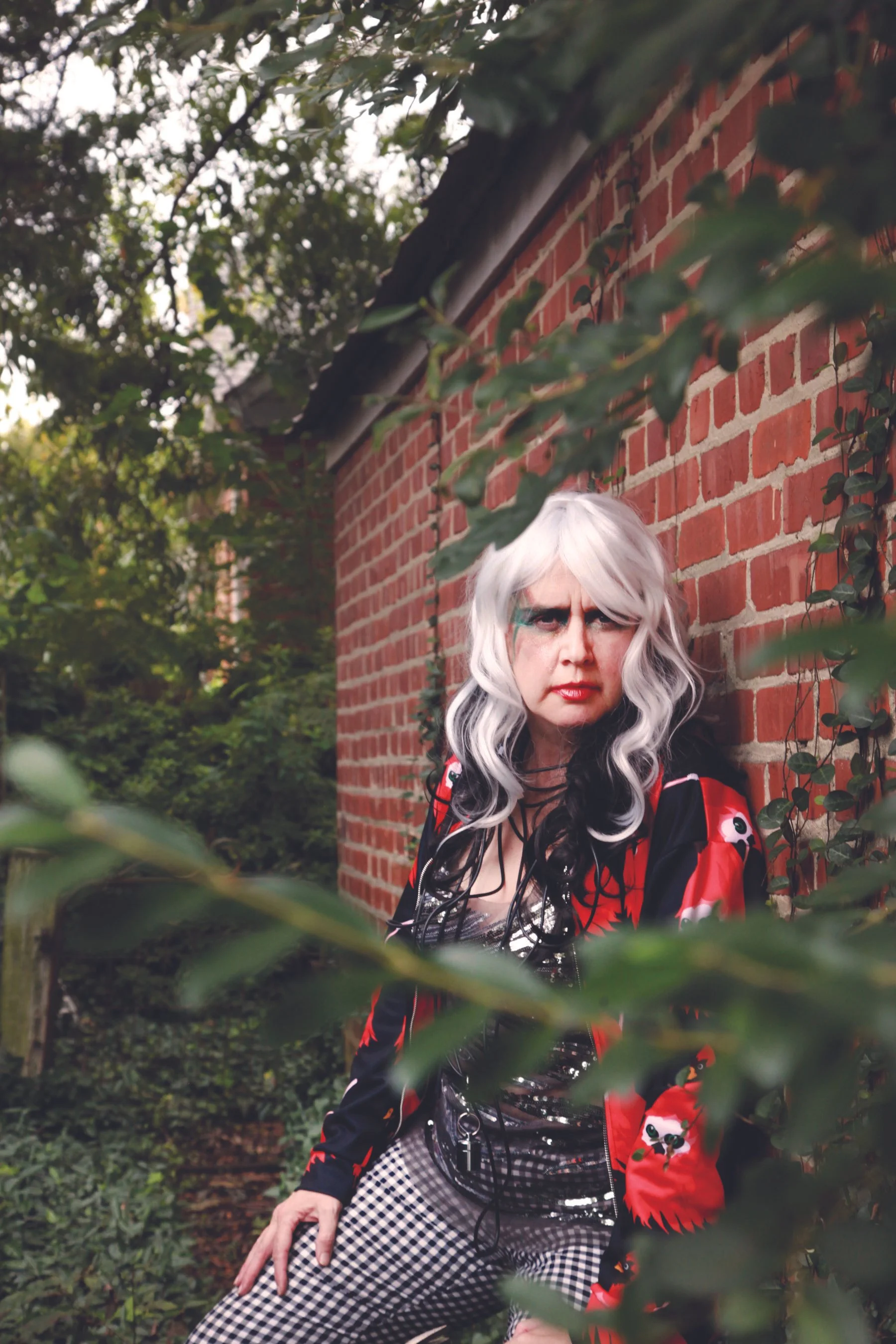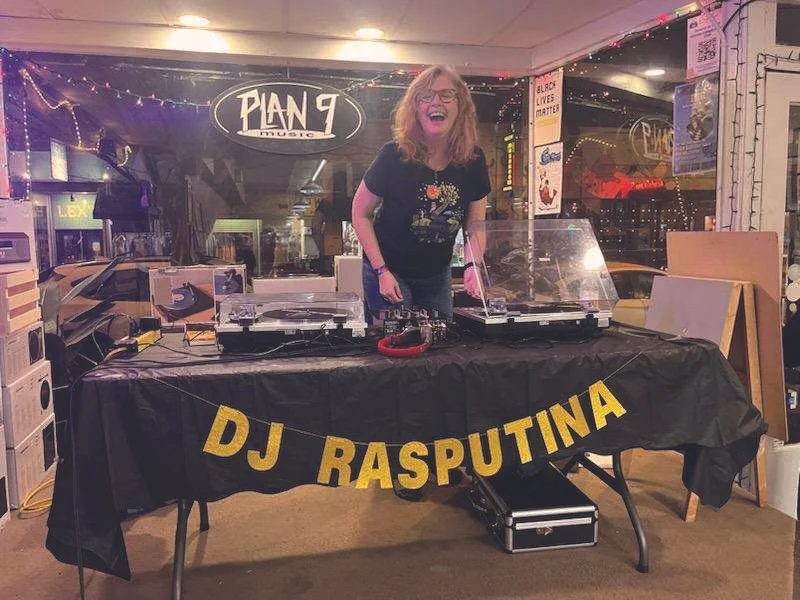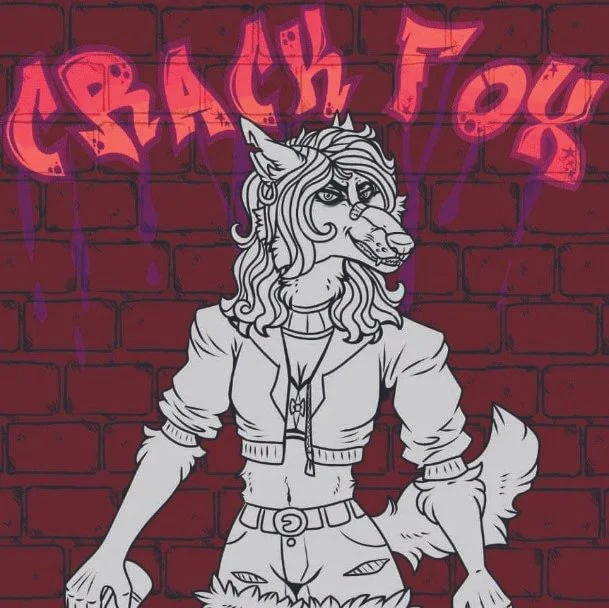Rasputina
Rasputina AKA Alane Ford
by Charles McGuigan 09.2025
Alane Ford—the woman who became Rasputina—has been in bed with Death for about three decades now, has spooned with this grimmest of reapers more than ten thousand times. That can take a lot out of a body, and it can even force a sort of transformation and cleave a personality in halves. And though they’re still joined at the hip, and presumably elsewhere, when Rasputina takes center stage, Alane exits. This woman is about as hard to parse as Molly Bloom’s one sentence soliloquy. The lowly scribe of this profile wrestled with three different titles: The Dying of the Light, Leaps of Faith, or Unorthodox Orthodoxy, but finally settled on Rasputina, AKA Alane Ford.
In the beginning, Alane Ford was a product of Richmond Public Schools—William Fox Elementary, Albert Hill Middle and Richmond Community High. She then attended William and Mary where she studied Spanish and German, language and literature. It was during her junior year that the scales dropped from her eyes, which widened with perfect sight as she ingested the words and stories of Franz Kafka that she read in the original German.
“Kafka hit me at the right point, right at the age when you start to say, ‘Wait a minute: I was raised to think this, that and the other, but I’m my own human being and I’m experiencing the world and I’m seeing things that don’t fit with what I thought the world was,” Alane tells me during an interview that will span three hours.
She remembers when she first began reading Kafka. “I had a misunderstanding about what adulthood was, like so many children do,” Alane says. “As a child I assumed that there was justice in adulthood, that adulthood was fair.” And after reading “The Metamorphosis,” and “The Trial” her understanding began to change. “What I didn’t understand was that that was just a hint of what was to come,” she says.
After graduation, Alane entered University of Virginia for a short time and then transferred to Union Theological Seminary back in Richmond. During her time at the seminary, still in her mid-twenties, Alane began working in hospice.
“I’m thirty years into death and dying,” she says.
And then she tells me this: “The bad death is the person who has not reconciled themselves to their life, their values, and the people they love. That can be a ninety-five-year old who thought they had a great life and then realized in their Kafka ‘Metamorphosis’ moment as they’re dying that they’re fraught with regret and fear. Fear and regret and shame.”
For some twenty years she held a number of hospice jobs. “I started as a hospice chaplain solely, which was, in those days, essentially a type of a counselor,” she says. “But I always had something else going. I would do grief groups and other things. I’ve always been a side hustle queen.”
She remembers getting a telephone call that would change the trajectory of her life. Alane picked up the receiver, and tucked it in the crook between her shoulder and her ear. Clamped to her hip was her youngest child, Jefferson, who was about a year and half old at the time.
It was someone from the Unitarian Universalist Church over on Blanton Avenue, the church Alane had attended for years. They were having a bit of crisis over there and needed help. So Alane stepped in as an interim pastor. This was even before her formal ordination as a Unitarian minister. “I was supposed to go in and help them manage their crisis for about six months and then I left six years later,” Alane says.
During her interim there, the congregation swelled; by the time she left it was 400 strong.
Side hustle queen that she was, Alane always had another gig going. One was at Shenanigans, a great dive of a restaurant/bar on MacArthur Avenue in the spot that now houses Demi’s. At the time it was one of the few smaller venues in the city that featured local bands. And everybody and anybody on the local music scene performed there. It was smoke-filled and dim-lit and the owners lined the bar along with the regulars. There were fights every now and again, but they were quickly taken outside—creating performance art on the sidewalk. For Page Wilson, one of Richmond’s most diligent supporters of local musical talent, Shenanigans was a second home where he frequently played with his band Reckless Abandon.
“I had served a year and a half at the church, but I was doing a side hustle behind the house at Shenanigans because of my love of music,” says Alane. “I would work the door and shake down people for four dollars for each person.”
From left, Crack Fox band members, Ben Beale, Rasputina, Phil D, Briant Murphy. Photo by Nicki Murphy.
One of the bands that played there frequently was NrG Krysys, and though she didn’t really know him, Alane would form a sort of bond with one of its members—a man named Bryan Harvey.
“Bryan stood out in NrG Krysys and I talked with him,” Alane says. “I said something like, ‘What is a guy who works in IT doing wearing polyester pants on a Saturday night in Northside? And he laughed and told me a little bit about it, and then he flipped the script and said, ‘Is this your only job?’ And I burst out laughing and said, ‘No I work at a Unitarian congregation.’ And that’s how we ended up talking about spirituality. We had a great conversation about really deep stuff.”
Two years later, their paths would cross again.
On the first day of 2006 Bryan and Kathryn Harvey, along with their two little children, Stella and Ruby, were brutally murdered in their Woodland Heights home.
“I knew that the Harveys did not have traditional beliefs and that the Unitarian Universalist Church would be a welcoming place for people who were not of a mainstream religious background to come and find a sense of calm,” says Alane. So she printed up four flyers announcing that UU would welcome all people for a time of remembrance of the Harvey family. The flyer included a contact telephone number. One flyer was posted in Plan 9, another went up at World of Mirth. Almost immediately, the phone began ringing off the hook. That Wednesday night a crowd of hundreds swarmed the church, spilling out the front door. Folks packed the parking lot, looking in, and though they couldn’t hear the words Alane spoke about vulnerability and grief.
“Rocks started rolling,” Alane remembers.
Members of the Harvey family asked Alane to do a series of services. One was at the Byrd Theatre which attracted about 1,200 people, another at World of Mirth, and the final one—a graveside service at Hollywood Cemetery.
“My job was to eulogize four people in one service which is incredibly hard, it’s four funerals in one,” says Alane. “My job also was to find hope in a time when we didn’t know who the culprits were, why it was done, who was next.”
She interviewed scores of people who knew the Harveys, from family members to band mates, from teachers to neighbors, from close friends to passing acquaintances. This was an effort for Alane to get to know the Harveys herself.
“I needed to find that scarlet thread,” Alane says, and she tears up.
That thread was the universal strand that runs through every human being, their wondrous imperfections. “It was their outrageous fun, their fantastic sense of humor, their uniqueness that allowed them to truly be who they were,” says Alane. They were truly loved by so many people because they were imperfect, funny, talented, inspiring people.”
After her stint at UU and a divorce, Alane jumped back into hospice, with her customary side hustles.
About ten years ago Alane began doing a locally produced show on WRIR called Death Club Radio. Originally it was with Chris Dovi and Don Harrison, but Alane wanted an “everyman” voice to accompany her. “Otherwise my stuff could get way too clinical,” she says. Just before she was about to produce one of her programs, she realized her “everyman” was a no-show. It just so happened that Phil Ford was in another studio at the time. “He didn’t offer to do it,” says Alane. “He kind of begged to do it. He just knew he’d be good at it because he had a lot of questions about death. And so we paired up as a creative team.”
This would evolve pretty quickly into something more than a creative partnership. “Phil is my perfect match,” Alane says. “He is the salt to my pepper shaker.”
Rasputina Deejaying at Plan 9. Photo by Phil Ford.
The pair would marry in fairly short order and continue collaborating. They would do performance art pieces with the likes of Noah Scalin and Thea Duskin. They wrote a number of zines together. They even deejayed, sharing their library of eclectic vinyl records, seeing themselves as curators of their collection, and not DJ artists.
“So we had done spoken word, we had done performance art, we had done written word,” Alane says. The one thing they hadn’t done—but had talked about for years—was putting together a band. It was something they had been entertaining for quite awhile.
“We had a band idea and that was around the time we got married,” Alane recalls. “Phil was ending his band Get in the Car and was wrapping up SPLORK! So we were starting to talk about a band together.”
It would be some time before they put a band together, and, after many heated discussions, would ultimately decide on a sort of 80s punk band.
When COVID struck it put things on hold. To make matters worse, Alane contracted a very serious case of the virus, and then in 2021 was stricken with Long COVID. “I was very, very sick, and so I decided it’s now or never,” says Alane. “I thought, I don’t know if I’ll ever get better so we might as well have a good time.”
They ended up renting the Dika Newlin room at Orbital Music Park. Ian McQuarry of Hard Copy joined them for a time. “In the beginning the boys just got to play around together and make sounds and practice,” says Alane. “But I could only sing one song and it was To Hell With Good Intentions by Mclusky. I don’t know how many weeks it was that I could only do that one song but it was quite some time.”
Something sort of magical happened with that one song. “The singing strengthened my lung capacity so we started adding some songs,” Alane says.
Rasputina was given birth on air in the studios of WRIR. “That was my DJ name,” says Alane. “Rasputin has never intrigued me so much as why the Romanovs followed Rasputin. That’s what was intriguing. At the time my hair was kind of long and if I didn’t brush it enough, and let it hang down, it looked like Rasputin’s hair and that’s why I called myself Rasputina at WRIR. The other thing was it was a tongue in cheek tribute to the goddess Teena Marie, who was a queen of R & B and white. My show was almost ninety-eight percent African-American soul music.”
Something extraordinary happened when her ranting and raving counterpart emerged.
“As I practiced and my lungs got stronger, a fury came out of me,” she says. “I didn’t have an outlet for that because I’m a mom, I’m a daughter, I’m a neighbor, I’m a person who gives this life of service, and I’m not allowed to be angry in many circles. One of the true blessings of my husband is he allows me to be angry. We can be angry, we can not be our best selves and it does not damage our relationship, we are able to move past it.”
Throughout her professional life she has had to make nice with death, and Rasputina liberated her. “I had not had an outlet to rage at the injustice of death,” says Alane. “I have been very nice to death. I’ve been very conciliatory. I figured out that the number of deaths I have known is shockingly ten thousand people. So many of them absolutely tragic, just the worst of the worst, and the Harveys are just four of those thousands. The stronger I got, the easier it became to access that fury vocally. And it felt so much better. And nobody was hurt.”
Crack Fox sticker designed by Hope Ford.
“So my lungs kept getting stronger, and we wrote a lot of songs,” says Alane. The band’s name Crack Fox was the creation of Phil Ford. The current lineup of the band with Rasputina doing vocals, is Phil Ford on guitar, Ben Beale on bass, and Briant Murphy on drums.
These four, all of whom have demanding full-time jobs, practiced for a full year before they did their first gig. Since that time they try and do at least one gig a month, and they have already released one split vinyl album they did with Flannel called The Capitol City Confidential. And are working on another one.
And from the very start audiences have embraced them. I’ve seen them in performance on a number of occasions, and one of the things that you can’t help noticing is that their audiences are composed of people from every age bracket and gender, which tells you something—Crack Fox has what all musical artists desire, universal appeal.
Alane tells me about the one truly biographical song she wrote, which is one of the most popular songs in their catalog. It has become a sort of anthem for all women, and men. It was based on a number of things she experienced from the time she was a child.
“Starting from a young age, way too young, as early as eleven, I would be cat-called in the streets and not just me, it was every girl I knew,” says Alane. “We had not even gone through puberty yet, and grown men in cars, on motorcycles, on bicycles would whistle and howl.”
Just a couple years later, weeks after she entered her teens she attended her first concert—Van Halen at the Richmond Coliseum. “It was 1984 and I got groped by a stranger at the concert,” Alane said. “He grabbed my ass. It could not have been mistaken for something else. I was thirteen. And that just went on and on and on and on, to be quite honest.”
When she was in college at William and Mary she and six young women and a handful of young men were sitting around talking, and the conversation turned to recent things that had been added to the campus for the safety of female students—additional lighting, strategically placed call boxes and the like. “I don’t know anyone who’s ever been raped,” one of the male students said.
Alane looked at the faces of the young women there. “I knew that three out of the six had been raped,” she tells me. “I didn’t know the other ones that well. And two of the women at the same time said, ‘I’ve been raped and I don’t want to talk about it.’ The rest of us said either what had happened to us or that someone we knew had been raped. And to the credit of these young men, they were horrified.”
The rage that Rasputina unleashes in this song is palpable, you can feel it in your gut, and the band is seamless in their backup, and the audience becomes actively moved by the words penned by Alane Rasputina Ford.




